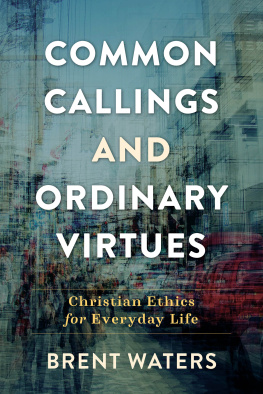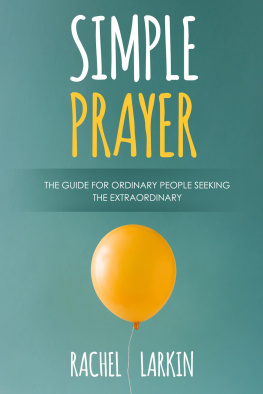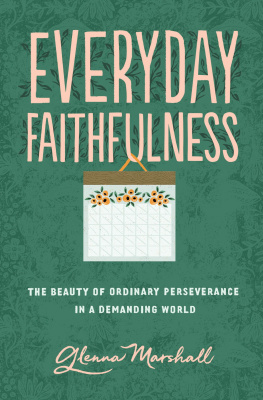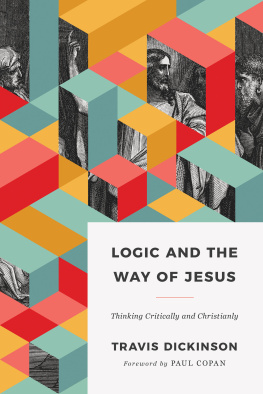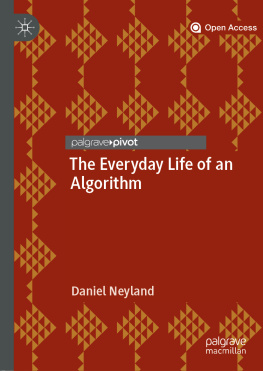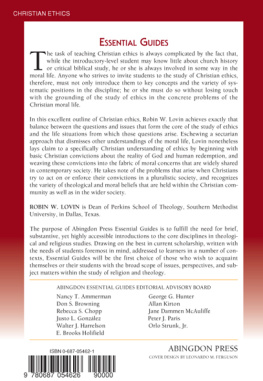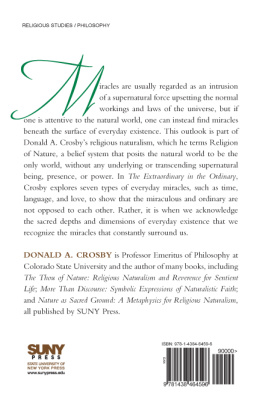Brent Waters - Common Callings and Ordinary Virtues: Christian Ethics for Everyday Life
Here you can read online Brent Waters - Common Callings and Ordinary Virtues: Christian Ethics for Everyday Life full text of the book (entire story) in english for free. Download pdf and epub, get meaning, cover and reviews about this ebook. year: 2022, publisher: Baker Publishing Group, genre: Religion. Description of the work, (preface) as well as reviews are available. Best literature library LitArk.com created for fans of good reading and offers a wide selection of genres:
Romance novel
Science fiction
Adventure
Detective
Science
History
Home and family
Prose
Art
Politics
Computer
Non-fiction
Religion
Business
Children
Humor
Choose a favorite category and find really read worthwhile books. Enjoy immersion in the world of imagination, feel the emotions of the characters or learn something new for yourself, make an fascinating discovery.
- Book:Common Callings and Ordinary Virtues: Christian Ethics for Everyday Life
- Author:
- Publisher:Baker Publishing Group
- Genre:
- Year:2022
- Rating:4 / 5
- Favourites:Add to favourites
- Your mark:
- 80
- 1
- 2
- 3
- 4
- 5
Common Callings and Ordinary Virtues: Christian Ethics for Everyday Life: summary, description and annotation
We offer to read an annotation, description, summary or preface (depends on what the author of the book "Common Callings and Ordinary Virtues: Christian Ethics for Everyday Life" wrote himself). If you haven't found the necessary information about the book — write in the comments, we will try to find it.
Brent Waters: author's other books
Who wrote Common Callings and Ordinary Virtues: Christian Ethics for Everyday Life? Find out the surname, the name of the author of the book and a list of all author's works by series.
Common Callings and Ordinary Virtues: Christian Ethics for Everyday Life — read online for free the complete book (whole text) full work
Below is the text of the book, divided by pages. System saving the place of the last page read, allows you to conveniently read the book "Common Callings and Ordinary Virtues: Christian Ethics for Everyday Life" online for free, without having to search again every time where you left off. Put a bookmark, and you can go to the page where you finished reading at any time.
Font size:
Interval:
Bookmark:
2022 by Brent Waters
Published by Baker Academic
a division of Baker Publishing Group
PO Box 6287, Grand Rapids, MI 49516-6287
www.bakeracademic.com
Ebook edition created 2022
All rights reserved. No part of this publication may be reproduced, stored in a retrieval system, or transmitted in any form or by any meansfor example, electronic, photocopy, recordingwithout the prior written permission of the publisher. The only exception is brief quotations in printed reviews.
Library of Congress Cataloging-in-Publication Data is on file at the Library of Congress, Washington, DC.
ISBN 978-1-4934-3257-8
Unless otherwise indicated, Scripture quotations are from THE HOLY BIBLE, NEW INTERNATIONAL VERSION, NIV Copyright 1973, 1978, 1984, 2011 by Biblica, Inc. Used by permission. All rights reserved worldwide.
Baker Publishing Group publications use paper produced from sustainable forestry practices and post-consumer waste whenever possible.
For
Diana and Erin
Half Title Page
Title Page
Copyright Page
Dedication
Preface
Acknowledgments
Part One: Theological and Moral Themes
1. Creation, Incarnation, and Resurrection
2. Calling and Vocation
3. Virtue and Vice
4. Ritual and the Ordering of Time and Place: On Belonging
Part Two: Everyday Relationships
5. Neighbors
6. Friends
7. Spouses
8. Parents and Children
9. Strangers
10. Citizens
Part Three: Everyday Activities
11. Work
12. Housework and Homework
13. Manners
14. Appearance
16. Leisure
Postscript: On the Good of Being Boring
Bibliography
Scripture Index
Subject Index
Back Cover
T he purpose of this book is to examine selected theological and moral themes that are embedded in the commonplace features of everyday life. Why would I expend time and energy inquiring into the humdrum when there are presumably more lively topics on offer? Because the realm of the ordinary, a prominent aspect of the human condition that is too frequently ignored, is foundational to properly ordering the Christian life in general and the Christian moral life in particular. Specifically, everyday relationships and activities develop habits that help to form ones character, and how one goes about performing daily chores and tasks enacts a sense of moral regard for ones neighbors. The commonplace is both a school of virtue and a vocational setting for refining what is learned. Consequently, my thesis is that by attending to ordinary relationships and mundane activities, we gain a deeper appreciation of what is most important in our lives and what is required for our flourishing.
When I started this project, I thought it would be easy to write a book on everyday life. I have, after all, lived a long, ordinary life, so I have plenty of experience to draw upon. I was wrong. This has been a difficult book to write. I think there are three principal culprits to blame for this difficulty.
First, the ordinary is both ubiquitous and sparse, and therefore elusive. The ordinary is unobvious, uninteresting, and all around usotherwise it wouldnt be, well, ordinary. In those rare moments when the ordinary catches our attention we find it to be intractably dull, mind-numbingly boring. Some ordinary events, however, are also common occurrences shared by members of a group but experienced infrequently and uniquely by individuals. Most people fall in love and suffer the loss of or estrangement from loved ones. These are commonplace events shared by countless people, yet each individual experiences them rarely and responds to them uniquely. The ordinary eludes our attempts to categorize and generalize because it consists of both the mundane and the eventful. It is untidy.
Second, my profession works against me. I was trained to be a moral theologian. I have developed critical and interpretive skills that help me focus on questions of good and evil, right and wrong, virtue and vice. Such disciplinary skills enable me to contribute to the discourse of Christian ethicists, which is presumably of some value to the academy, the church, and society. But my academic focus also means that I miss much else. I miss much not only because focusing on certain subjects necessarily makes me inattentive to others, but also because I have been shaped by the values and prejudices of my professorial guild. And those values and prejudices treat the ordinary with indifference if not contempt. How can I be bothered with such trivial concerns as shopping and chance encounters with strangers when I must solve the monumental issues of war and peace, justice, and genetic engineering? Ethics deals with big questions, larger-than-life issues. Even those rare attempts to pay attention to the quotidian often twist the mundane into something it should not and cannot be. Weeding an organic garden, for instance, is elevated to saving the planet from an ecological apocalypse. This is a vain boast because it bestows on the task a false significance that deceives, signaling a virtue where none exists. Weeding will not save the planet. It is simply a necessary, mundane act of gardening, and it is excruciatingly dull and monotonous.
Third, my cultural context is largely apathetic (and at times hostile) to the ordinary. The late-modern technoculture in which I live and workand in which I assume most of my readers reside as wellis fixated on the extraordinary. Everything is great, grand, awesome. Everyone is the best there ever was at whatever they do. We are addicted to personal excellence and get our fixes through a variety of technological aids and self-help strategies. It is all fantasy. If everything and everyone is extraordinary then nothing and no one is. It is a fantasy that flatters and thereby deludes. Like all fantasies, it distracts us from the real: a reality that is mundane, filled with ordinary people. The real world is not extraordinary, but it is where we are called to love God and neighbor. And that love is known and expressed, given and received, most often in unexceptional waysin the routines and patterns of daily life.
To assume that I have liberated myself from the liabilities noted above and have gone on to write an extraordinary book on the ordinary would itself be a deadly fantasy. Rather, I think (hope) that my awareness of these perceptions and distortions has enriched my understanding and appreciation of the mundane as a vital setting of moral formation and action.
So what kind of book did I end up writing? In answering, I begin by describing what the book is not, an approach that is bound to irritate my publisher. But stay with me; I soon switch to the positive.
This is not a formal book on or about ethics. I do not use the ordinary to develop, refine, or illuminate a tightly reasoned theory of moral vision, agency, or action. Nor do I propose any solutions to the hot issues of the day.
This is not a book that summarizes or utilizes ethnographic studies. Some excellent books on the ethics of everyday life have used this methodology, the mundane as a formative and normative narrative of the commonplace relationships and activities that are required for human flourishing.
This is a book on how the ordinary helps to form ones character. Attending to commonplace relationships and activities helps develop habits that in turn contribute to the formation of character by predisposing one toward virtue rather than vice. Learning to be courteous instead of rude, for instance, is morally significant when habituated or when such habituation fails.
This is a book on how the ordinary helps to reinforce social bonds. Humans are social creatures. We are drawn to one another and cannot survive for very long alone and isolated. These social bonds are most often maintained by mundane acts routinely performed by nameless people we encounter daily. For example, it is primarily strangers who produce, sell, or otherwise provide the goods and servicessuch as food and shelterwe require to sustain ourselves. The ordinariness of most of our basic needs and wants reminds us how much we depend on each other, day in and day out.
Font size:
Interval:
Bookmark:
Similar books «Common Callings and Ordinary Virtues: Christian Ethics for Everyday Life»
Look at similar books to Common Callings and Ordinary Virtues: Christian Ethics for Everyday Life. We have selected literature similar in name and meaning in the hope of providing readers with more options to find new, interesting, not yet read works.
Discussion, reviews of the book Common Callings and Ordinary Virtues: Christian Ethics for Everyday Life and just readers' own opinions. Leave your comments, write what you think about the work, its meaning or the main characters. Specify what exactly you liked and what you didn't like, and why you think so.

